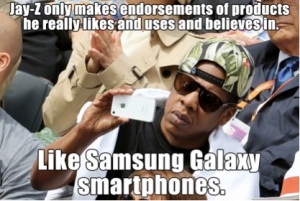Originally published by AudiophileLibrary on July 3, 2013.

In 1999 Shawn Fanning and Sean Parker, the founders of Napster, predicted that sharing music online would provide users the freedom from conventional consumer practices. Tonight their comment takes on a new resonance. At 12:01, when it officially becomes July 4, Independence Day, in the United States, Jay- Z’s new album Magna Carta Holy Grail will automatically be available for Samsung users that downloaded the Magna Carta app. This is the first album available exclusively on mobile devices for free before its wide release, which is set for July 9. Magna Carta represents the music industry’s transforming attitude toward the digital marketplace, acknowledging it as the premier space to advertise and consume music.
Jay-Z’s non-traditional approach to advertising the album illustrates a visionary understanding of the industry’s future. Instead of teasing listeners by issuing a lead single months ahead of time, Jay created a series of YouTube videos and television commercials discussing the concept behind making Magna Carta along side uber-producers Rick Rubin (though he does not actually produce any songs on the album), Timbaland, and Pharrell Williams. In the clip he reveals, “The album is about, like, this duality of how do you navigate your way through this whole thing, you know, through success, through failures, through all this and remain yourself?” Talking directly to audiences in these ads allows Jay to construct a vision behind the songs, rather than simply letting the music speak for itself. He used the platform as space to create not only an album, but also an experience centered on the basic human struggle for identity.
The innovative strategy turned into an art installation at Salisbury Cathedral in Wiltshire, England, where the album’s cover artwork was unveiled today, July 3. It features classical sculptures starting at the torso and the rapper’s name scrolled across the center with a thick black line slicing through the middle. The cover image is juxtaposed with one of only four existing copies of the original Magna Carta document, the charter drafted by King John’s feudal barons in 1215 to protect their personal rights and property from the despotic ruler. As the first major document to challenge monarchical power, Magna Carta served as inspiration for American colonists seeking independence during the Revolution. It became a core reference point for the United States’ core principle of liberty. Referencing Magna Carta, Jay-Z’s album becomes a symbol of freedom from traditional modes of purchasing music and perpetuates the sense of individual freedom that dominates the personalized culture of mobile devices we live in today. It’s no accident that the album will become available to Samsung users on July 4. Jay-Z is making a statement about how we experience the music that makes us who we are.
Magna Carta Holy Grail also changes the way record companies recoup expenses when they give artists advances to record. The Wall Street Journal‘s Hannah Karp writes that Samsung paid $5 a piece for one million copies of the album so Galaxy S3, Galaxy S4, and Galaxy Note 2 users could receive the album for free. I would argue this transaction is the future of music retail. As companies like Samsung try to compete with Apple’s stronghold on digital music consumption, and streaming services like Google Play, Spotify, Grooveshark, and Pandora continue to provide alternatives to purchasing music at the iTunes store, electronics companies will continue trying to outdo one another by offering listeners mobile access to music from big-name artists like Jay-Z. This strategy will help electronics companies determine their own identities in consumers’ consciousnesses as the market is continually saturated with smartphones and tablets.
So what is the consequence of making music even more ubiquitous than it already is in our earbud culture? My greatest concerns lie in music becoming a tool to sell products instead of being the product itself. The almost limitless portability of music already allows us to take it for granted. If the music shifts out of focus ,we lose the joy, feeling, and community it can develop. What incentive would artists have to chase the artistry of an album like Sgt. Pepper’s Lonely Hearts Club Band, What’s Goin On, or Nevermind? Letting music become a byproduct would also lead to artistic insincerity in an industry where that concept is already suspect. We need to protect the artists that still stand for integrity and passionately pursue creative excellence. I respect Jay-Z’s work and have for years, but if this meme is any indication, we need to be cautious:
Tonight when the clock strikes 12:01, Magna Carta Holy Grail will become part of our mobile libraries. As a result, musicians–and us by extension, their listeners–will face a decision similar to America’s forefathers over 230 years ago. We will be granted a new form of independence but will then have to decide the best way to utilize it.
Since I originally posted this article in 2013, a parody video was released by EliteDaily.com:

I understand your anxieties over the fact that music is becoming secondary to other electronic products. But it is a natural progression. Music has been appearing in television commercials for years and they rarely advertise the bands or song titles. Artists and record companies have to find new ways to gain exposure in the digital world where people are glued to their mobile devices and listen to music for free on sites like YouTube and Spotify. Anyway, here’s another funny parody of the Jay-Z ad you posted: http://www.youtube.com/watch?v=XRAIOeDkOJA.